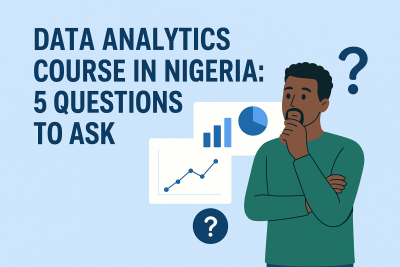
SOPHIA OLISE
 Data Analysis
Data Analysis
 0 comment
0 comment
 03 Sep, 2025
03 Sep, 2025

Data analytics has rapidly become one of the most sought-after skills in the Nigerian job market. From the bustling streets of Lagos to the innovation hubs of Abuja, businesses across every sector from finance and telecommunications to e-commerce and healthcare are generating vast amounts of data. The ability to transform this raw data into actionable intelligence is a superpower that can unlock new career paths and drive significant business growth. Whether you are a student, a young professional seeking to upskill, or a business owner looking to make smarter, data-driven decisions, learning data analytics can give you a significant competitive edge.
However, the sheer number of training centers, online platforms, and bootcamps available can make choosing the right course a confusing task. Investing in your education is a big decision, and you need to ensure you get real value for your money and time. Before you enroll and pay that fee, here are five essential questions you must ask to ensure the course you choose aligns perfectly with your career goals and provides a clear return on investment.
Not all data analytics courses are created equal. Some programs offer a superficial overview, while others provide a deep dive into the foundational and advanced skills that employers are actively seeking. A good course curriculum should be structured to guide you through a logical progression, starting with the basics and building up to more complex topics.
Look for a course that takes a holistic approach. It should begin with core concepts like data types, data cleaning, and basic statistical analysis. It should then progress into the critical tools of the trade, combining theoretical knowledge with hands-on practice. A robust curriculum will cover not just one tool, but a combination of them, preparing you for the multifaceted nature of real-world data jobs. A well-designed course should also offer a clear pathway from data analysis fundamentals to more specialized areas, such as business intelligence or machine learning, allowing you to tailor your learning journey as your skills develop.
The quality of your learning experience is directly tied to the expertise of your instructors. A great data analytics trainer is more than just a teacher; they are a mentor with a wealth of industry experience. Ask about the instructors’ backgrounds. Do they have hands-on experience solving real business problems in the Nigerian market? Are they professionals who have worked in sectors like fintech, retail, or the public sector?
An instructor who understands the local context can provide invaluable insights into the specific challenges and opportunities within the Nigerian data landscape. They can use relevant case studies like analyzing customer behavior for a Nigerian e-commerce platform or forecasting sales for a local retail chain which makes the learning more relatable and practical. This kind of mentorship is what transforms theoretical knowledge into a powerful, job-ready skill set.
Employers in Nigeria are looking for candidates with practical, demonstrable skills in a variety of tools. The data analytics landscape is broad, and no single tool can do everything. Therefore, a good course should equip you with a versatile toolkit.
The most in-demand tools for data analysts in Nigeria include:
Ensure the course you choose covers at least three of these tools. A combination of Excel, SQL, and a visualization tool like Power BI is an excellent starting point that makes you immediately marketable.
Data analytics is an applied field, and theoretical knowledge without practical application is of little value. The best way to learn is by doing. Inquire about the practical component of the course. Does the program provide access to real or simulated datasets? Are there case studies that mirror real business problems?
Practical projects are your opportunity to build a professional portfolio that showcases your skills to potential employers. They prove that you can move beyond theory and apply your knowledge to solve real-world problems. Look for a course that emphasizes project-based learning, culminating in a capstone project that you can confidently present in a job interview.
Finally, consider what happens after the course is over. A training program should be a stepping stone to a successful career, not a dead end. Ask about the type of certification provided. Is it a well-recognized certificate that can validate your skills to recruiters?
Beyond certification, look for courses that offer tangible career support. This can include job placement assistance, mentorship programs, resume and CV reviews, or mock interview sessions. Such support can be the difference between gaining a skill and landing a job. Choose a course that not only educates but also helps you position yourself for career growth and connect with a network of professionals.
Your learning journey doesn’t have to be confusing. Start with a foundation in Excel, then advance into tools like SQL and Power BI. At ECR Academy, we provide structured courses, practical projects, and mentorship to guide you from beginner to professional.
Whether you're starting or upgrading your tech skills, you can begin your learning journey with us today.
Review Affordable Tech Course with us at ECR Academy We provide the hands-on, project-focused training you need to master tech skills like Digital Marketing, Web development, Data Analysis, Cybersecurity.
Build Comprehensive Digital Solutions with ECR Technology Services Limited Let us help you bring your brand, business, or idea online with professional digital solutions such as secure, responsive websites, robust mobile applications, high-impact digital marketing templates, and specialized Learning Management Systems (LMS).
Contact Us Today:
Courses range from ₦100,000 to ₦350,000 depending on duration, tools taught, and whether mentorship is included.
With consistent practice, beginners can gain solid skills within 3–6 months.
Yes. Many reputable platforms and local academies including ECR Academy offer online courses tailored for Nigerians.
No. Anyone—students, business owners, or professionals can learn. A good course will teach from the basics.
Start with Excel, then move to SQL and Power BI. These three tools are the most in demand in Nigeria.
SOPHIA OLISE
Data Analyst
Olise Sophia Amarachi is a passionate and purpose-driven data analyst and digital skills advocate based in Nigeria. With a strong foundation in Excel, Power BI, and SQL, she empowers others—especially young people and corps members—through practical training, tech mentorship, and values-based leadership. Sophia’s journey into data analysis began during her NYSC year in Abia State, where she committed herself to learning and growing from scratch. Today, she shares her knowledge through online classes, challenges, and hands-on projects, including dashboards and reports that translate complex data into clear insights.
0 comment